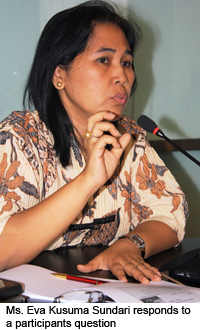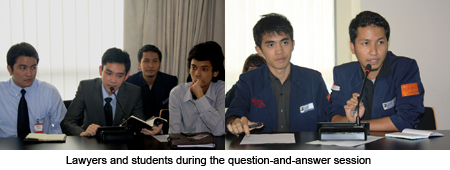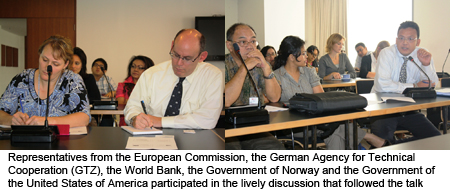Indonesian member of Parliament speaks out against corruption: "Before we ask others to be accountable, Parliament must make itself accountable"
 Jakarta (Indonesia), 2 September 2010 - Since early 2009 UNODC has organized a series of public talks on combating corruption. On 23 August, the fifth in this series of talks in 2010 featured Eva Kusuma Sundari, representative of the Indonesian Parliament for the Indonesian Democratic Party of Struggle and member of the Public Accounts Committee.
Jakarta (Indonesia), 2 September 2010 - Since early 2009 UNODC has organized a series of public talks on combating corruption. On 23 August, the fifth in this series of talks in 2010 featured Eva Kusuma Sundari, representative of the Indonesian Parliament for the Indonesian Democratic Party of Struggle and member of the Public Accounts Committee.
The title of Ms. Sundari's talk was "The budget making process in the Indonesian Parliament: how to control fraud and corruption from within".
A two-term member of Parliament, Ms. Sundari served on the Indonesian Parliament's performance enhancement team, whose task it was to identify potential flaws in the performance of the Parliament.
Ms. Sundari reported "that people were not happy about the way we work and about our lack of productivity. We were perceived as corrupt and, as a matter of fact, 25 corrupt members of Parliament were exposed by the Corruption Eradication Commission."
The performance enhancement team concluded that corrupt practices were common in Parliament, especially during the budget process. Thus, Ms. Sundari stressed the need for open and transparent consultations in Parliament during the discussion of the Parliament's budget.
She suggested that the roots of corruption are embedded in the vested interests of families, feudalism and economic and political interest groups, and said that in order to combat corruption it was necessary to work on Government reform (to improve the bureaucracy) and to increase the salaries of public-sector employees. It was also important to strengthen the capacity of law enforcement agencies so that officials could better address the challenges posed by corruption.

Nevertheless, the debate showed that efforts to make Parliament more accountable largely depend on the integrity of individual members of Parliament. It became clear that it was important to address issues such as working in the interest of the public versus personal gain.
In Law No. 27 of 2009, at least five new articles were passed to improve mechanisms aimed at reducing corruption among members of Parliament. For example, pursuant to article 200, most Parliamentary meetings should be open sessions (under the previous legislation, most such meetings took place behind closed doors).

Ms. Sundari pointed out that "before we ask other people to be accountable, Parliament must make itself accountable. It is impossible to ask somebody else to be accountable if we refuse to be evaluated and reviewed". Ms. Sundari also explained that the Public Accounts Committee uses the United Nations Convention against Corruption as its reference document to promote integrity, accountability and the proper management of public affairs and public policy.
Ms. Sundari urged political parties and the media to be more supportive and start working on performance indicators for members of Parliament. She concluded by stating that "what I want is for us members of Parliament not to be evaluated in general. Please evaluate us on a individual basis. This will encourage us to improve our performance."
 Jakarta (Indonesia), 2 September 2010 - Since early 2009 UNODC has organized a series of public talks on combating corruption. On 23 August, the fifth in this series of talks in 2010 featured Eva Kusuma Sundari, representative of the Indonesian Parliament for the Indonesian Democratic Party of Struggle and member of the Public Accounts Committee.
Jakarta (Indonesia), 2 September 2010 - Since early 2009 UNODC has organized a series of public talks on combating corruption. On 23 August, the fifth in this series of talks in 2010 featured Eva Kusuma Sundari, representative of the Indonesian Parliament for the Indonesian Democratic Party of Struggle and member of the Public Accounts Committee.

